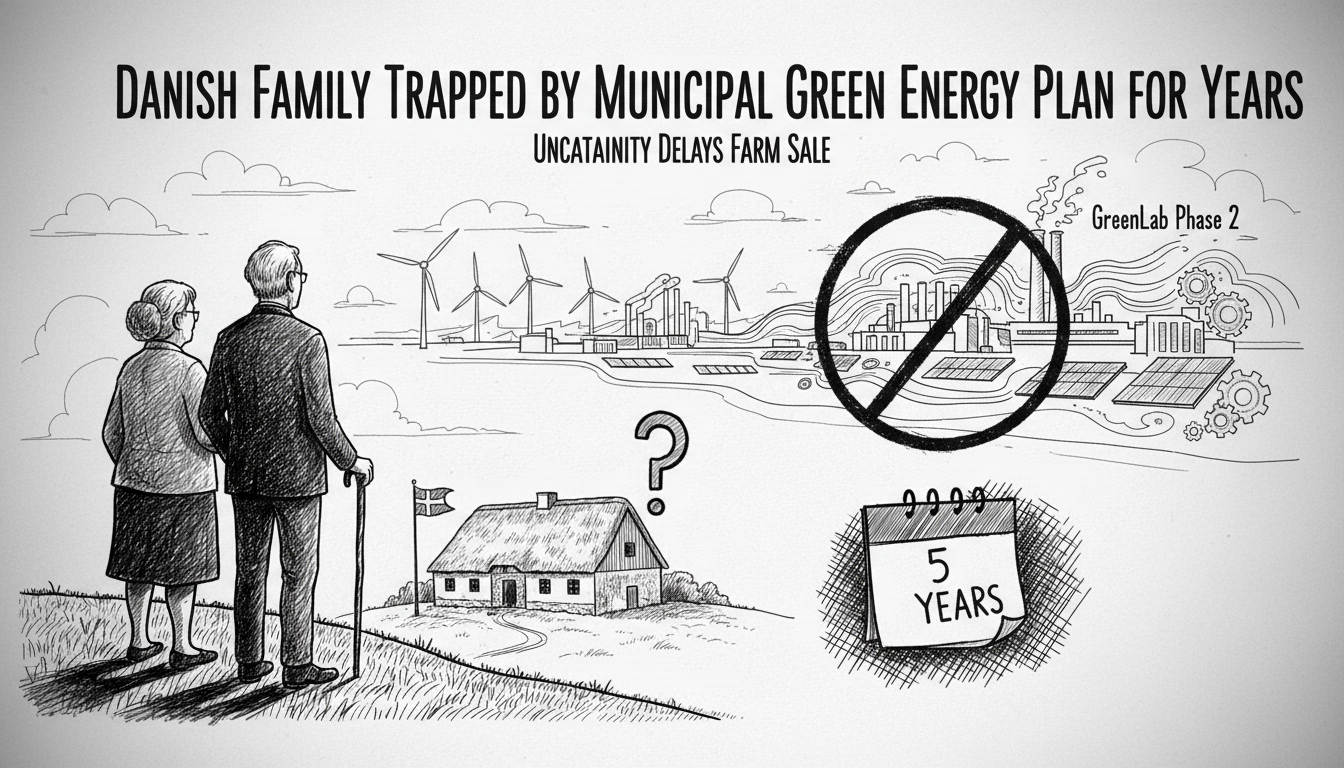Annette Rulffs has one simple dream—to sell her farm and move closer to family. But for nearly five years, she has been trapped by municipal planning decisions that have left her property in limbo.
The 70-year-old and her husband live on Næstildgård near Oddense in central Denmark. Their property sits within a 70-hectare area designated by Skive Municipality for the second phase expansion of GreenLab, a green industrial park. The municipality drew boundaries around their land half a decade ago, but since then, nothing has happened.
"It's deeply frustrating," Rulffs explained. "You know what you want to do, but you can't do anything. You can't make any decisions. We can't move forward or backward. We just sit here waiting for the municipality or someone to decide that something should happen."
The couple planned to sell their farm when Rulffs reached retirement age and move to Zealand to join their entire family. They envisioned buying a new farm with their daughter, son-in-law, and grandchild to live together multigenerationally. That dream now sits on indefinite hold.
"We can't sell now," she said. "Nobody wants to buy when they don't know how long they can live here. And if we do manage to sell, the price would be so low we wouldn't have money to buy anything afterward."
GreenLab represents Denmark's ambitious green transition strategy. The industrial park hosts companies focused on sustainable energy production, connected through a direct energy supply system and SymbiosisNetTM—an intelligent network for sharing excess energy and resources between businesses.
The planning committee chair for technical and environmental affairs, Goska Rasmussen, acknowledges the problem but sees only one solution: a comprehensive development plan. She hopes the new municipal council will prioritize creating such a plan when it takes office in January.
"I don't feel good about having citizens who are tied down like this," Rasmussen stated. "It's not fair that she has to wait year after year to learn what will happen with this area. My answer is that I will work for a comprehensive plan."
Rasmussen emphasized that any solution must involve collaboration with GreenLab as a business and other investors. "We can't just buy properties without having a purpose for them," she noted.
The situation highlights a common tension in Nordic municipal planning—balancing ambitious green development projects against individual property rights. Denmark's comprehensive zoning laws give municipalities significant power to designate land for future development, but this can create years of uncertainty for affected property owners.
Recent developments might accelerate the process. GreenLab recently received designation as a state-recognized industrial park. This status means production companies locating there can access the Business Authority's "One Stop Shop" program, streamlining permit processing with guaranteed timelines of 12-18 months depending on project complexity.
Both the municipal mayor and GreenLab's director hope this designation will attract more companies to the area. Rasmussen shares this optimism: "Things moved a bit slowly, but now I hope this provides some turbocharge so we can create that comprehensive plan."
Still, state industrial park status doesn't guarantee the municipality will purchase Rulffs' property. "As a municipality, we can't do that if we don't have a purpose," Rasmussen explained. "The purpose could be that there's no more space in area one because GreenLab is expanding. But we can't do that at the present time when area one isn't filled up."
Rulffs isn't alone in her predicament. Twenty-two other properties in the originally designated GreenLab area two have agreed to sell, but their sales depend on permission to erect new wind turbines. Currently, existing GreenLab companies don't need additional energy capacity.
What Rulffs wants most is a timeline. "That would help tremendously," she said. "Or they could somehow organize things so they can buy out those who want to move. Alternatively, they could buy us out so we live here as tenants until we find something else."
At 70 years old, Rulffs still works full-time as a job consultant while she and her husband operate a riding school. She hopes they can sell soon enough that she can still help renovate and prepare their new family farm.
"It won't get easier the older I get," she noted. "So it really needs to happen very soon. We all just want closure on this so we can move on with our lives."
The situation illustrates how even well-intentioned green transition policies can create unintended consequences for ordinary citizens caught in planning limbo. As Denmark pushes forward with its ambitious climate goals, balancing large-scale infrastructure projects with individual property rights remains an ongoing challenge for municipal governments across the Nordic region.

